Indonesia is willing to establish diplomatic relations with Israel if and when an independent Palestinian state is recognized by Tel Aviv, Indonesian President Prabowo Subianto said yesterday.
In a press conference with visiting French President Emmanuel Macron, Prabowo acknowledged that Israel’s security needs to be guaranteed, but that a “two-state solution and the freedom of Palestine is the only way to achieve true peace.”
“We must acknowledge and guarantee Israel’s rights as a sovereign country that must be paid attention to and guaranteed safety,” he told reporters. “Indonesia has stated that once Israel recognizes Palestine, Indonesia is ready to recognize Israel.”
Like many Muslim-majority states, Indonesia has never had diplomatic ties with Israel, owing to the nation’s long opposition to the Israeli occupation of Palestinian territory, a position that is supported by large swathes of the Indonesian public.
The crisis in Gaza was high on the agenda during Macron’s stop in Jakarta, part of a regional tour that has already taken him to Vietnam and will involve a stop in Singapore later this week.
In recent weeks, French officials have indicated that they may soon recognize a Palestinian state, following an intensification of Israel’s attempts to cleanse parts of Gaza of their Palestinian populations. “Only a political solution will make it possible to restore peace and build for the long term,” Macron said yesterday. “Together with Saudi Arabia, we will soon be organizing a conference on Gaza in New York to give fresh impetus to the recognition of a Palestinian state and the recognition of the State of Israel and its right to live in peace and security in this region.”
While Prabowo’s comment about normalization made international headlines, including in Israel, it did not represent any real change in Indonesia’s policy. This has always called for the resolution of the Israel-Palestine conflict via the creation of a Palestinian state under a “two-state solution.” The fact that Israel’s Prime Minister Benjamin Netanyahu is currently doing his best to render the possibility of this outcome nonviable, both in Gaza and in the West Bank, suggests that there is little chance of a rapprochement any time soon.
The only possibility is a shift in Indonesia’s policy. In recent years, the U.S. government has shepherded several previously staunch opponents of Israel, including the United Arab Emirates, Bahrain, and Morocco, toward diplomatic relations with Tel Aviv under the so-called Abraham Accords.
In early 2021, in the final weeks of the first Trump administration, it was reported that the U.S. was willing to offer Indonesia a hefty financial inducement to join this group in recognizing Israel. Similar reports surfaced last year, to the effect that Indonesia was willing to normalize ties with Israel as part of its bid to become the 39th member of the OECD, which would require Tel Aviv’s support. On both occasions, the Indonesian government denied any suggestion that it was preparing to abandon its longstanding policy.
This has only been hardened by the horrific humanitarian crisis that has unfolded in Gaza since October 7, 2023, when the Palestinian militant group Hamas launched violent attacks into Israel, prompting a brutal Israeli response that appears to have evolved into a project of ethnic cleansing in parts of Gaza. In the immediate wake of the Hamas attacks, the Indonesian Foreign Ministry called for an “immediate end of violence” and said that “the root of the conflict, namely the occupation of the Palestinian territories by Israel, must be resolved, in accordance with the parameters agreed upon by the U.N.”
Prabowo is a pragmatic leader who would not shy away from changing a long-standing policy if it brought substantial benefits for his country. And it is also true that despite having no formal diplomatic relations, Indonesia and Israel maintain quiet ties in the realms of trade, security, and tourism. The two nations’ militaries have a long history of contacts, and in 2016, an Israeli official put the total trade between the two nations at “hundreds of millions of dollars” per year, most of it routed through third countries. In late 2021, Prabowo even spoke with Itay Tagner, Israel’s chargé d’affaires to Bahrain, during a security conference in the Bahraini capital Manama.
However, any Indonesian leader wishing to shift Jakarta’s policy would need to reckon with the fact that support for the Palestinian cause, and a converse hostility toward Israel, runs deep among Indonesian Muslims. This is led by Islamic organizations spanning the Indonesian political spectrum, from the giant national organizations Nahdlatul Ulama and Muhammadiyah to smaller, more radical groups, all of which have been vocal in their condemnation of Israel’s recent assaults on Gaza.
All of this guarantees that any Indonesian leader seeking to take steps toward formal recognition of Israel would face a considerable, and perhaps politically fatal, domestic backlash. As one observer noted yesterday, Prabowo’s close links with Islamist groups could give him a greater chance than his predecessor of pulling off such a diplomatic pirouette. But in light of the atrocities still being committed by the Israeli military in Gaza, a rapprochement between Jakarta and Tel Aviv would appear to be as far away as ever.

































